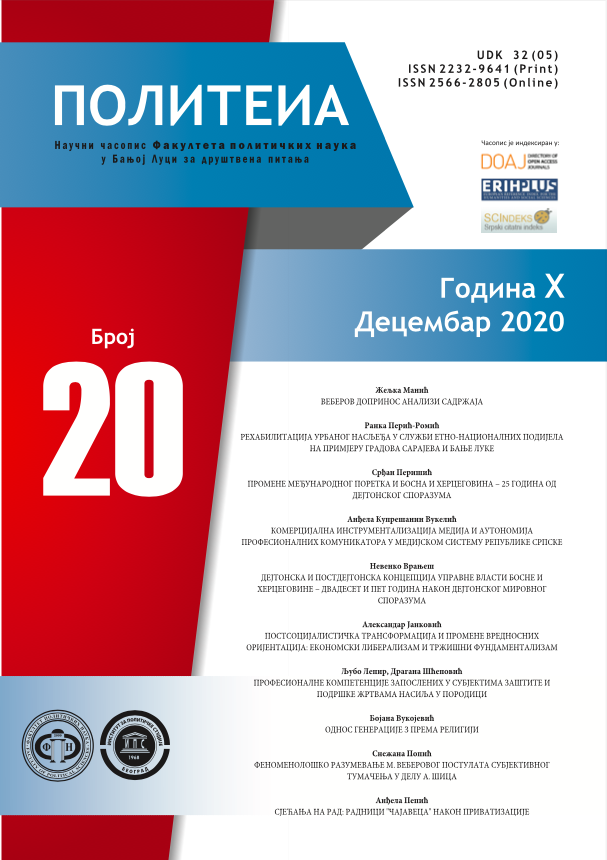THE RELATIONSHIP OF GENERATION Z WITH RELIGION
Abstract
In recent years, there has been an increased interest in research into religiosity of different generations, especially Millenials. In this paper, we will examine the relationship of Generation Z to religion. As the most numerous population, characterised by insecurity and concern for the socio-economic and security aspects of the world in which we live, by digital mediation and socialisation accompanied by the availability of the Internet, by racial and ethnic diversity, and by supporting individual freedom and sexual amorphousness, they are the first post-Christian generation as well, shaping the world like no other generation to this day. Given the aforementioned, the subject of our research is the religious and spiritual values that this generation cultivates. The paper uses secondary data derived from the Pew Research Center research, as well as studies based on qualitative and quantitative research comparing different generation cohorts. The paper consists of three parts, with the first part presenting the sociological characteristics of Generation Z, the second one explaining the popular concepts of modern religiosity together with the respective pieces of criticism, and the final one observing Generation Z as representatives of the post-Christian world. Considering the overall social transformation that accompanies this generation, in conclusion we find that Generation Z treats religion and elements of religion as trends, that there is a search for ‘religious shortcuts’, i.e. that it channels its spirituality through rituals and ceremonies that meet their current needs and are not necessarily related to one religion.
References
Bauman, Z. (2004). Identity. Conversations with Benedetto Vecchi. Cambridge: Polity Press.
Bruce S. & Voas, D. (2010). Vicarious Religion: An Examination and Critique. Journal of Contemporary Religion, 25(2), 243‒259. DOI: 10.1080/13537901003750936
Castells, M. (1997). The Power of Identity, The Information Age: Economy, Society and Culture Vol. II. Cambridge, MA; Oxford, UK: Blackwell.
Davie, G. (2007). Vicarious Religion: A Methodological Challenge. In Nancy T. Ammerman (Ed.), Everyday Religion: Observing Modern Religious Lives (pp. 21‒35). Oxford University Press. DOI:10.1093/acprof:oso/9780195305418.003.0001
Dejvi, G. (2008). Evropa: izuzetak koji dokazuje pravilo? U: Berger, P. (prir.), Desekularizacija sveta. Preporod religije i svetska politika. (str. 81–101). Novi Sad: Mediterran Publishing.
Jaeger, H. (1985). Generations in History: Reflections on a Controversial Concept. History and Theory, 24(3), 273-292. doi:10.2307/2505170
Levickaitė, R. (2010). Generations X, Y, Z: How Social Networks Form The Concept Of The World Without Borders (The Case Of Lithuania). Creativity Studies, 3(2), 170‒183. doi.org/10.3846/limes.2010.17
Mardešić, Ž. (2007). Rascjep u svetome. Zagreb: Kršćanska sadašnjost.
Marshall, G. (1998). A Dictionary of Sociology (2nd ed.). New York: Oxford University Press.
Nikodem, K. (2010). Religija i obitelj. Utjecaj kršćanskog identiteta na percepciju odnosa roditelja i djece. Socijalna ekologija, 19(2), 173‒194. Preuzeto s https://hrcak.srce.hr/59830
Nikodem, K. (2011). Religija i crkva. Pitanja institucionalne religioznosti u suvremenom hrvatskom društvu. Socijalna ekologija, 20(1), 5‒30. Preuzeto s https://hrcak.srce.hr/67436
Nikodem, K. i Zrinščak, S. (2019). Između distancirane crkvenosti i intenzivne osobne religioznosti: religijske promjene u hrvatskom društvu od 1999. do 2018. godine. Društvena istraživanja, 28 (3), 371‒390. https://doi.org/10.5559/di.28.3.01
Pew Research Center (2019). Generation Z Looks a Lot Like Millennials on Key Social and Political Issues. https://www.pewsocialtrends.org/2019/01/17/generation-z-looks-a-lot-like-millennials-on-key-social-and-political-issues/
Pew Research Center. (2018). Early Benchmarks Show ‘Post-Millennials’ on Track to Be Most Diverse, Best-Educated Generation Yet. https://www.pewsocialtrends.org/2018/11/15/early-benchmarks-show-post-millennials-on-track-to-be-most-diverse-best-educated-generation-yet/
Pew Research Center. (2020a). On the Cusp of Adulthood and Facing an Uncertain Future: What We Know About Gen Z So Far. https://www.pewsocialtrends.org/essay/on-the-cusp-of-adulthood-and-facing-an-uncertain-future-what-we-know-about-gen-z-so-far/
Pew Research Center. (2020b). U.S. Teens Take After Their Parents Religiously, Attend Services Together and Enjoy Family Rituals. https://www.pewforum.org/2020/09/10/u-s-teens-take-after-their-parents-religiously-attend-services-together-and-enjoy-family-rituals/
Seemiller, C., Grace, M. (2019). Generation Z. Century in the making. London: Routledge. https://doi.org/10.4324/9780429442476
Sierra Gutiérrez, L. I. (2017). Faith in the net: towards the creation of digital networks of religious acknowledgement and recognition. ESSACHESS - Journal for Communication Studies, 10(2), 93-111.
Trninić, D. (2018). Religija u ogledalu vremena. Banja Luka: Udruženje za filozofiju i društvenu misao.
Varkey Foundation. (2017). What the world’s young people think and feel. Generation Z: Global Citizenship Survey. https://www.varkeyfoundation.org/media/4487/global-young-people-report-single-pages-new.pdf
Voas, D., & Crockett, A. (2005). Religion in Britain: Neither Believing nor Belonging. Sociology, 39(1), 11–28. https://doi.org/10.1177/0038038505048998
White, J. E. (2017). Meet generation Z: understanding and reaching the new post-Christian world. Michigan: Baker Books.
Autori koji objavljuju u ovom časopisu pristaju na sljedeće uslove:
- Autori zadržavaju autorska prava i pružaju časopisu pravo prvog objavljivanja rada i licenciraju ga "Creative Commons Attribution licencom" koja omogućava drugima da dijele rad, uz uslov navođenja autorstva i izvornog objavljivanja u ovom časopisu.
- Autori mogu izraditi zasebne, ugovorne aranžmane za neekskluzivnu distribuciju članka objavljenog u časopisu (npr. postavljanje u institucionalni repozitorijum ili objavljivanje u knjizi), uz navođenje da je članak izvorno objavljen u ovom časopisu.
- Autorima je dozvoljeno i podstiču se da postave objavljeni članak onlajn (npr. u institucionalni repozitorijum ili na svoju internet stranicu) prije ili tokom postupka prijave rukopisa, s obzirom da takav postupak može voditi produktivnoj razmjeni ideja i ranijoj i većoj citiranosti objavljenog članka (Vidi Efekti otvorenog pristupa).

